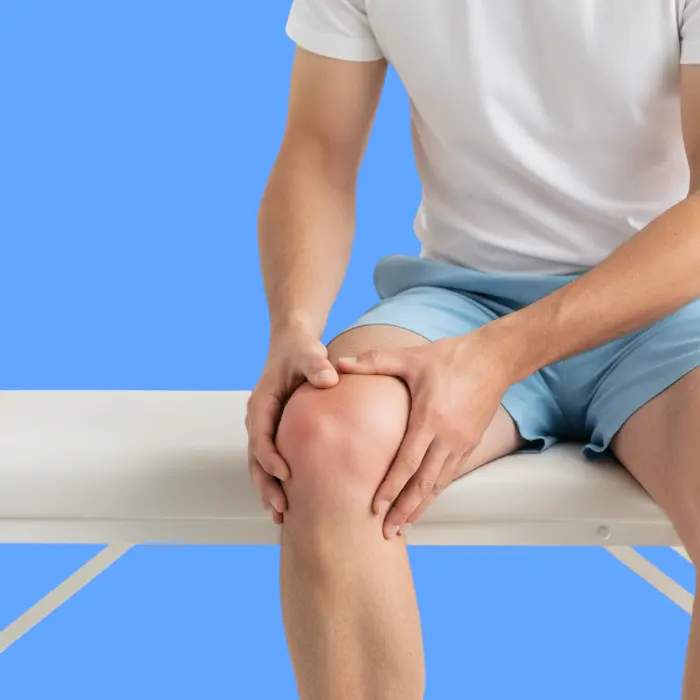what is knee osteoarthritis?
Knee osteoarthritis is a common condition that affects the largest joint in the body. It occurs when the cartilage covering the ends of the bones inside the knee gradually wears down.
This erosion makes movement painful and causes the bones to rub against each other, leading to swelling and stiffness in the joint. It often appears with aging, but it can also affect younger people due to certain factors.
what are the causes of knee osteoarthritis?
The causes of knee osteoarthritis vary from person to person depending on lifestyle and genetic factors. They include:
- Aging, which reduces synovial fluid production and weakens tissues.
- Excess weight, which puts constant pressure on the joint.
- Previous knee injuries such as fractures or tears.
- Practicing intense sports or physically demanding jobs.
- Genetic factors, especially if one parent is affected.
- Weak muscles surrounding the joint.
- Chronic joint inflammation such as rheumatoid arthritis.
- Knee deformities or abnormal walking patterns.
what are the common symptoms of knee osteoarthritis?

Symptoms of knee osteoarthritis appear gradually and vary in severity depending on the stage of the disease. They include:
- Knee pain that worsens with movement or prolonged standing.
- Joint stiffness, especially upon waking or after sitting.
- Cracking or grinding sounds when moving the knee.
- Mild to moderate swelling around the joint.
- Difficulty fully bending or straightening the knee.
- Feeling unstable while walking.
- Changes in the shape or alignment of the knee.
- Difficulty climbing stairs or sitting and standing.
when should you see a doctor?
It is recommended to consult a doctor when symptoms persist or affect daily life. These include:
- Pain lasting more than a week without improvement.
- Noticeable swelling or redness in the knee area.
- Inability to move the knee normally.
- Feeling of joint locking or instability.
- Unusual sounds during movement.
- Difficulty performing daily activities like walking or standing.
- Family history of osteoarthritis.
- Home treatments failing to relieve symptoms.
what are the treatment options for knee osteoarthritis?
Treatment methods vary depending on the severity of the condition and symptoms. They include:
- Anti-inflammatory medications to relieve pain.
- Physical therapy to strengthen surrounding muscles.
- Weight loss to reduce pressure on the knee.
- Cold or hot compresses depending on the case.
- Nutritional supplements like glucosamine.
- Local joint injections such as cortisone or plasma.
- Lifestyle changes and avoiding strenuous activities.
- Surgical intervention in advanced cases like joint replacement.
can knee osteoarthritis be cured?
Complete recovery from knee osteoarthritis is not always possible, especially in advanced stages. However, symptoms can be managed and quality of life improved.
This depends on early diagnosis, commitment to treatment, and lifestyle changes to reduce joint pressure.
what are the prevention tips for knee osteoarthritis?
Prevention starts with healthy daily habits and helps reduce the risk of developing or worsening the condition. They include:
- Maintaining a healthy weight to reduce joint load.
- Regular exercise to strengthen muscles.
- Avoiding sudden or strenuous knee movements.
- Wearing comfortable and supportive shoes.
- Eating a diet rich in calcium and vitamin D.
- Avoiding prolonged standing or sitting without movement.
- Consulting a doctor when experiencing unusual pain.
- Avoiding frequent stair climbing unnecessarily.
what are the possible complications of knee osteoarthritis?
If not treated properly, knee osteoarthritis may lead to complications that affect daily life. These include:
- Increased pain and difficulty moving.
- Loss of ability to walk long distances.
- Noticeable changes in knee shape or alignment.
- Weakness in surrounding muscles.
- Need for surgical intervention like joint replacement.
- Psychological impact due to persistent pain.
- Reduced physical activity and weight gain.
- Problems in other joints due to movement compensation.
frequently asked questions about knee osteoarthritis
Does knee osteoarthritis affect young people?
Yes, especially in cases of injury or genetic factors.
Can you exercise with knee osteoarthritis?
Yes, but choose light exercises under medical supervision.
Do supplements help in treatment?
They may relieve symptoms but are not a final cure.
Does knee osteoarthritis lead to paralysis?
No, but it may severely limit movement if neglected.
article summary
Knee osteoarthritis is a common condition that affects joint movement and quality of life, but it is not the end of the road.
With proper treatment and lifestyle changes, symptoms can be managed and complications avoided, Prevention starts with daily body care and paying attention to early warning signs.